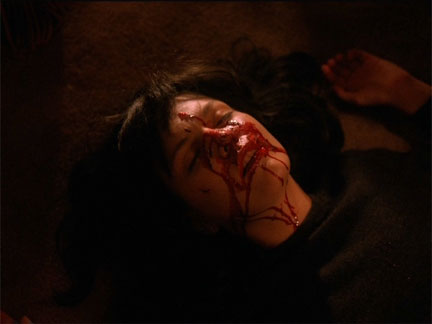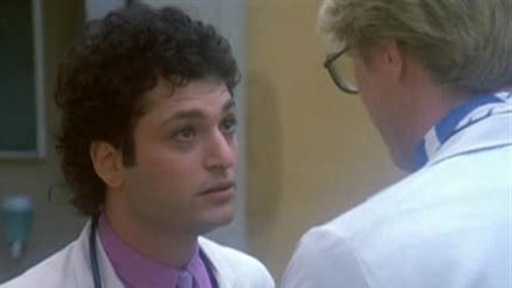With LOST now gone, it's time for me to come up with a new favorite show. Right now, the leader in the clubhouse comes from an unexpected source - Glee.
If the writers of the show, which is more often than not extremely light-hearted and campy, continue to slip in scenes like this one from - of all sources, Mike O'Malley - the Emmy nominations are sure to come flying their way.
Maybe it won't stand the test of time, but that scene did what most good television should do… cause the viewer to have a visceral reaction to what they see and hear.
It got me thinking, and here are some of the other sequences off the top of my head that made me an active participant in what I was watching, rather than simply a passive observer. I look forward to your comments and suggestions for others to add to the list. (I've limited the list to one scene per show, and not included shows that are strictly comedies.)
1) Twin Peaks - The sequence that starts with the Log Lady appearing at the police station and goes on to show us Maddie being killed is still, to me, the greatest fifteen minutes of television ever filmed. From the innovative use of the camera to the sheer violence of the murder, and a haunting score underneath, I still can't take my eyes off the screen when watching.
2) The Prisoner - The "opening credit" sequence of the very first episode is a master class of how to take what most shows today would use three seasons worth of exposition to get through and get the whole hypnotic and confounding series rolling in about three minutes.
3) My So-Called Life - The final scene of this underrated series has only gotten better with age. After Krakow tells Angela that he, in fact, authored the love note that Jordan Catalano gave her, she still gets in the car and drives off with Jared Leto. Then the show was canceled, leaving viewers forever wondering what was going on in her mind at that moment and what the fallout of this revelation would be.
4) Lost - From the pilot, the aftermath of the plane crash sucks the viewer right into the engine, and sets the standard for how a series can hit the ground running.
5) Buffy the Vampire Slayer - So many brilliant episodes to choose from, but for my money, the episode "Hush" in which there is no dialogue for nearly the entire episode is the best in terms of requiring you to pay complete attention to the screen. And what you saw when you did was not always pretty.
6) NYPD Blue - The episode where Jimmy Smits' character, Bobby Simone dies was one of the most gut-wrenching and real things I've ever seen on television. No gunshot wounds… no explosions… simply a slow and anguishing withering away in a hospital bed as a result of heart disease.
7) Journeyman - This was a show that deserved a better fate, as it was canceled just as it started to find its way. Forget all the mumbo-jumbo of the "time travel" abilities of the main character.
As a relatively new father to a son myself, I was simply spellbound by a scene where Dan returns home from a "trip" to discover he and his wife no longer had the son he left, but rather a daughter who he has never met.
Determined to go back to correct the mistake, his wife - who in this "reality" only knows her daughter - is equally adamant he does no such thing. A powerful moment from two parents who are both 100 percent justified in their position.
As a relatively new father to a son myself, I was simply spellbound by a scene where Dan returns home from a "trip" to discover he and his wife no longer had the son he left, but rather a daughter who he has never met.
Determined to go back to correct the mistake, his wife - who in this "reality" only knows her daughter - is equally adamant he does no such thing. A powerful moment from two parents who are both 100 percent justified in their position.
8) St. Elsewhere - MASH did dream sequences better, but the episode where Howie Mandel's Dr. Wayne Fiscus has a near-death experience and ends up touring both heaven and hell was sheer brilliance, especially when God appears to have a chat with Wayne and looks just like Wayne. "I created you in my own image. How else would you expect me to look?"
9) Star Trek: TNG - For all of the Borg battles, the most impactful episode to me was called "The Inner Light" where a mysterious probe sends Picard on a journey that, to him, takes decades - he has a family, children, and even grandchildren - but at the end of the episode, when the probe runs out of energy, he is returned to his "real existence" where only a few minutes has passed.
Yet, for Picard, the loss of this second life, which was very real to him, is one he'll never truly recover from.
Yet, for Picard, the loss of this second life, which was very real to him, is one he'll never truly recover from.
10) Fringe - In the post 9/11 world, use of the image of the Twin Towers needs to be handled delicately. However, there was no better way to symbolize that we had entered an "alternate universe" than to have the camera pull out to reveal that William Bell (Leonard Nimoy) had an office in the World Trade Center, untouched by terrorism.
Bold? Yes. Powerful? You bet.











http://www.youtube.com/watch?v=LN5eYFH8HZ8
ReplyDelete